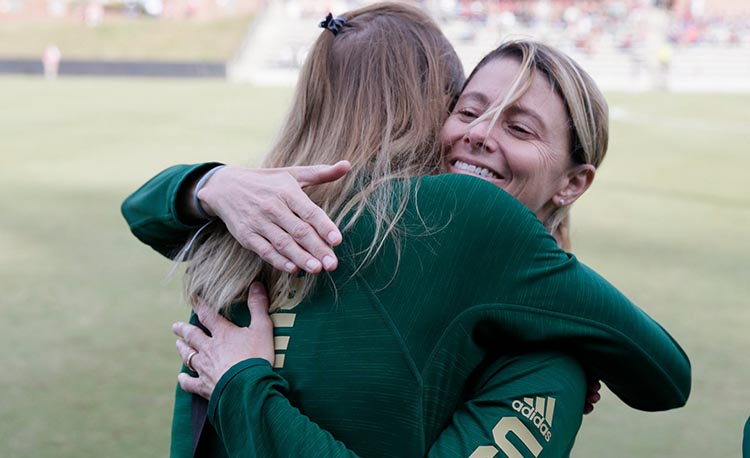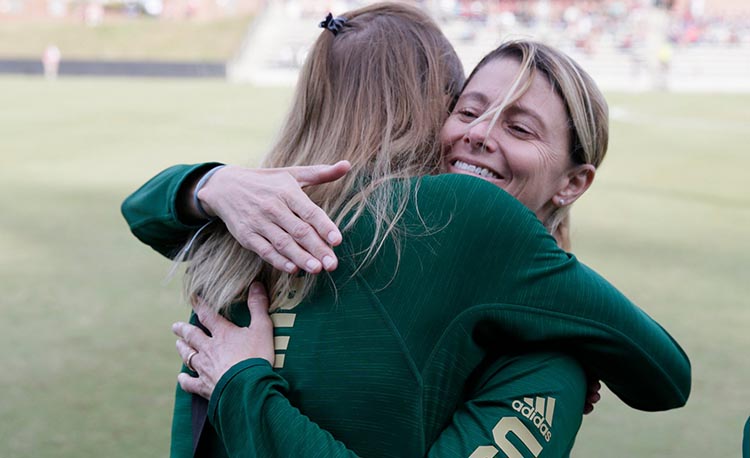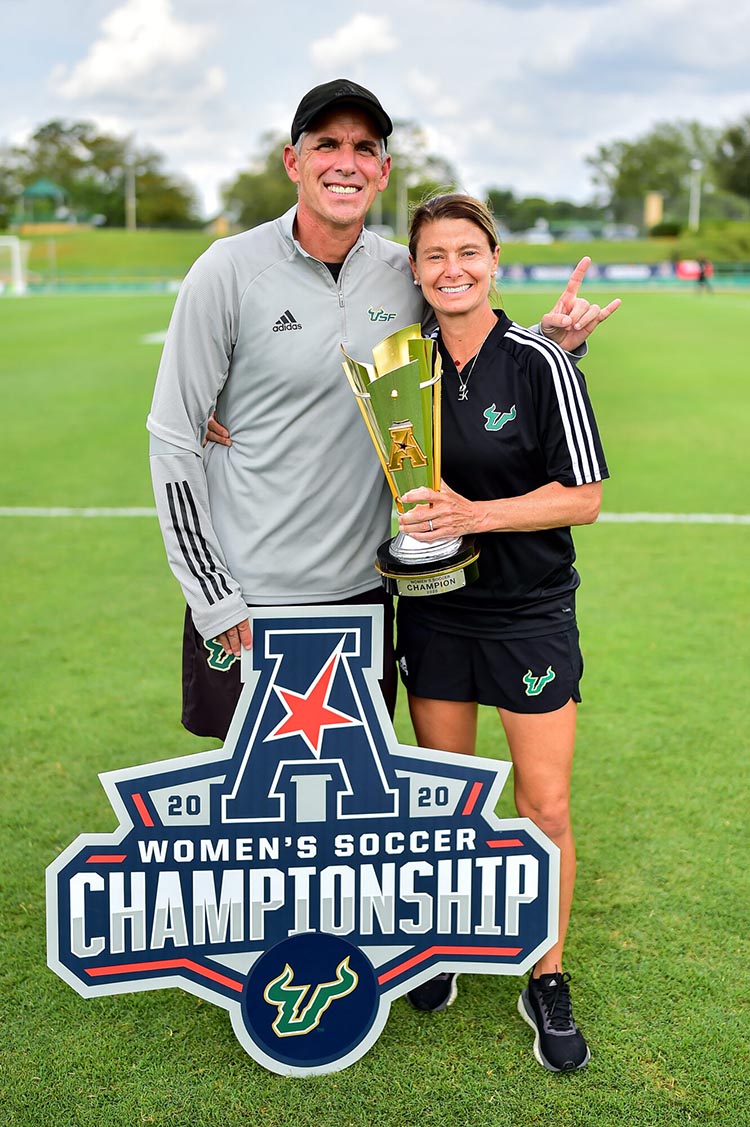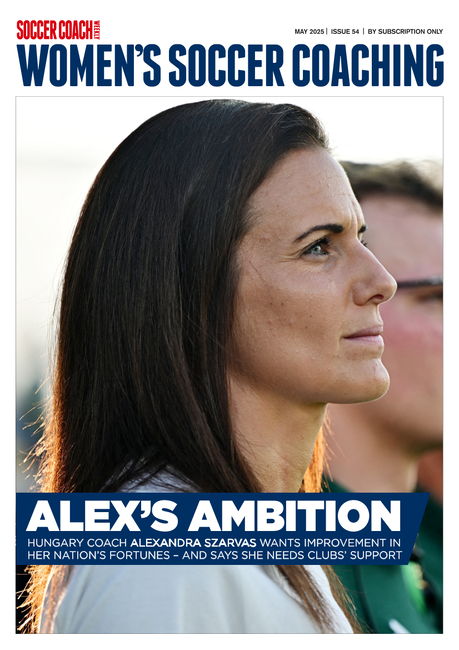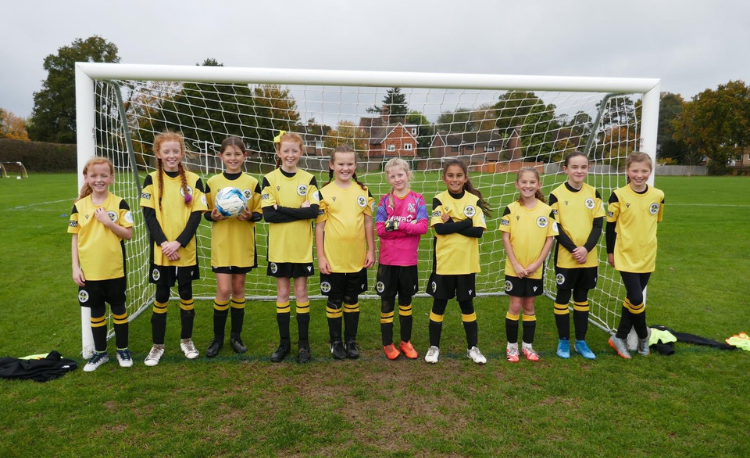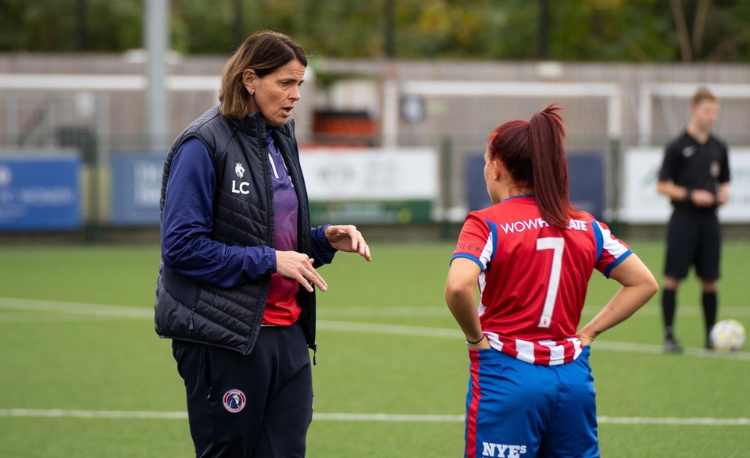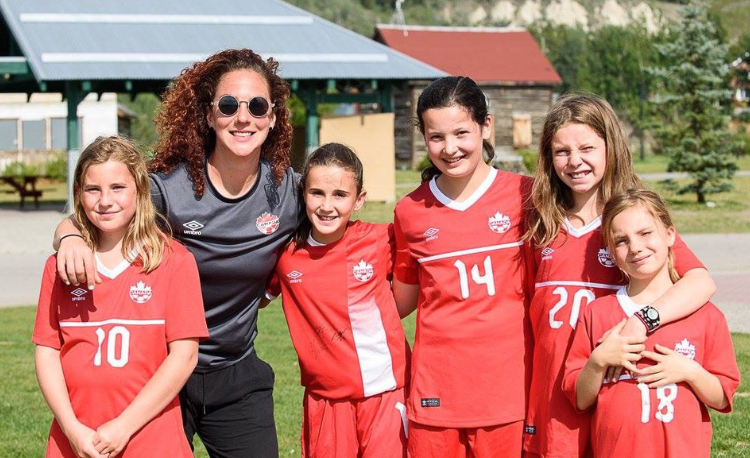You are viewing
1 of your 3 free articles
Denise Schilte-Brown: Developing top strikers
As a player, she set college scoring records and played for Canada. Now, Denise Schilte-Brown is inspiring the next generation, including new Olympic gold medallist Evelyne Viens - and her own soccer-mad twins...
As a player, Denise Schilte-Brown set college scoring records on her way to playing professionally in Germany and representing her native Canada.
And in almost 25 years as a coach, she has mentored some top strikers, including current Canada breakthrough star Evelyne Viens.
It is fair to say Schilte-Brown knows where the net is - and knows how to bring that out in others.
Viens is a case in point. She graduated from Schilte-Brown’s University of South Florida (USF) program in 2019 with a record- breaking 76 goals in 77 games, and has just won Olympic gold with Canada - despite only making her national-team debut in February.
“It’s pretty much unheard of,” Schilte- Brown told Women’s Soccer Coaching. “But that’s the type of impactful player she is. I’m a big Evelyne Viens fan.”
Schilte-Brown also cites Viens as an example of a player who added strings to their bow while at university in an attempt to reach the top of the pro game.
She said: “Evelyn is a great model of that player who used her one tool – being able to turn and explode into the space – to climb the ladder of early success.
“Then she quickly realized if she was going to get to that next level, she had to be able to head the ball – which was nowhere near her toolbox when she entered college – and she had to be able to time her movements to receive the ball behind the defenders. So her game completely took the next step.”
“I was very privileged to coach elite players at an extremely young age...”
It is no surprise that Viens was so prolific at USF, given the success of her head coach.
In the early 1990s, Schilte-Brown studied for a bachelor’s degree in economics at the University of Maryland, Baltimore County (UMBC). Her numbers were just as good on the field as in classes.
In four years playing for UMBC, she scored 55 goals and created 38 more - team records that still stand today and led to her becoming the first female soccer player to be inducted into UMBC’s Athletics Hall of Fame.
Schilte-Brown was team MVP in three of her four seasons and in 1996, the year she graduated, was named the Big South Conference Player of the Year.
She then spent two years playing in Germany and three in the W-League in the US, while in 1997, aged 23, she was part of Canada’s national team.
But coaching was always in Schilte- Brown’s thoughts, even in her early playing days. She dipped her toe in as assistant coach at Eckerd College and the University of Tampa - and head coach of the Tampa Heather Under-13s and Under-19s - while still in her mid-20s.
She later served four years as a regional coach for the USA’s Olympic Development Program, and as a coach for U23 national team camps, among other roles.
Her natural playing talent and strong CV certainly helped her take to coaching from a relatively early age, but Schilte-Brown admitted self-taught confidence was the key.
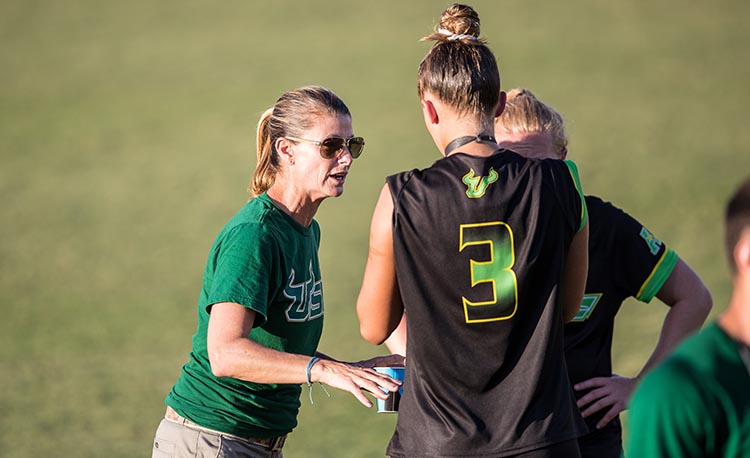
“I was a very young coach,” Schilte-Brown said. “I was privileged to coach elite players at an extremely young age.
“I demonstrated a lot. I used my ability and what I was good at on the pitch to show the players how to get there. But one of my greatest strengths as a player was my mentality.
“I always had such high self-esteem, I was very confident in what I did. I believed in myself, and those intangibles helped separate me from some other players.
“I’m able to bring that into my coaching and share the mindset that I think elevated me far above the quality of player that I really was.
“In hindsight, I don’t think I really belonged on the pitch with some of the athletes that I was competing against. But I didn’t allow myself to see myself any other way than an elite athlete worthy of the opportunities that I was given.”
It is a fascinating insight into the mentality of a top striker - Schilte-Brown also admitted that in her early days: “I couldn’t relate to anybody that didn’t want to score all of the goals.”
But now she recognises that strikers need more in their lockers than just a ‘fake-it-til- you-make-it’ attitude and a single-minded hunger for hitting the back of the net.
“As young strikers, we all thought we were pretty awesome, scoring all the goals for our team,” she said. “Defensive effort was not something we had a desire to improve on.
“But you’re seeing these great strikers - Christine Sinclair, Carli Lloyd, Christen Press - putting in the work for their teams now. The best strikers in the world work the hardest for their teams defensively.
“Instead of making that first-pressure effort, they’re putting in second, third and at times fourth efforts for their teams to maintain the press and win the ball higher up the pitch.
“I couldn’t relate to anybody that didn’t want to score all of the goals...”
“I also think we’re seeing more complete players as the game has evolved. The strikers in the past might have been able to play at the next level relying on one special quality, but the tools in their toolbox need to be greater.
“They have to be able to manage the ball back to goal, they have to be able to turn, they have to have at least a short burst of speed to get into the space.
“The timing of when they get there has to be a little bit more accurate because the center-backs are becoming far more athletic. The days of just having the big, strong, slow kid playing in the back are over. So that matchup has become a little bit more difficult for the strikers.”
That poses an interesting question. It is often felt that coaches may have particular strengths in teaching their own playing position - but what about passing on the secrets of the striking trade to your centre- backs?
“I do enjoy that a lot”, Schilte-Brown said. “I think most strikers enjoy coaching defenders.
“We feel like we can give them an edge and help them understand the mentality of what they’re up against, and how to get into the striker’s head.
“Defenders are different from strikers, they are less needy. I feel like you have to stroke your strikers’ egos a lot and keep their mentality high.
“Defenders are typically black and white, they seem to manage their emotions a little bit more.”
Whichever end of the field Schilte-Brown focuses on, it has been working.
The 47-year- old is now in her 15th season in charge of the South Florida Bulls, and has guided them into the NCAA tournament on seven occasions.
The 2020 season, played out this spring because of the Covid-19 pandemic, saw USF finish undefeated in the regular season for the first time in the program’s history. They were dubbed by local media “The InvinciBulls” and five members of the team were named in the first-team all-conference list.
With her every step of the way has been husband Chris, a former professional player with Richmond Kickers, who is USF’s associate head coach. The pair met 25 years ago, as players in their respective teams at Baltimore Bays. Their burgeoning relationship survived Denise’s two years in Germany and they married in 2001, before Denise gave birth to twins - Ethan and Kenza - in June 2005. Now 16, both Ethan and Kenza are soccer players themselves, despite their parents’ attempts to introduce them to other sports.
“We thought it would be a lot of pressure on the twins to play soccer, having to live up to what my husband and I had done,” Schilte- Brown said.
“My son outright refused to play other sports; he’s only really ever gravitated to soccer.
“My daughter branched out into other sports, and we would always encourage her, but she would say, ‘I don’t understand why you’re doing that, I’m a soccer player’”.
Whatever the future holds for the pair of them, they will carry the Schilte-Brown soccer legacy, built up over the last quarter of a century, through the next couple of decades.
Related Files
DENISE SCHILTE-BROWN’S TOP TIPS FOR GRASSROOTS COACHES
GET A STRIKER BACK INTO FORM BY ANALYSING THEIR PERSONALITY
“A lot of it is an assessment of personality. For instance, you might have one striker who is very flashy and outgoing and has a leadership-style personality. My approach to her would be comparing her style to national-team players, feeding that outward confidence, talking about her body language.
“But you might have another striker that doesn’t love that limelight, they’re not looking for the cameras, but they might be a very statistical person, so maybe we’re going to look at the number of sprint efforts. Instead of focusing on outcome of goals, we’ll focus on things that are within their control, statistically - how many sprint efforts have you made in the game? What is your possession rate? - to eliminate the stress of trying to score a goal.
We do a pretty thorough analysis of our players’ personalities, digging into what makes them tick. We also do a thorough questionnaire of what they believe motivates them and then we try to use that in those times of need.”
BE RELATABLE - TAILOR YOUR PRACTICES TO THE MODERN GAME
“A lot of those kids are staying relevant to the only game they are ever going to see, the one in front of them [in stadiums and on TV]. The players aren’t going to relate to coaches if there is a disconnect between what they’re seeing and what they’re being taught.
“I believe in having a professional role model. If I had a young daughter of, say, eight, and she’s watching Christen Press play, I want her to emulate Christen Press. Using those references, those names and that something they saw on TV as part of a finishing drill can change the whole energy of a session, and the respect a player has for their coach.”
ENCOURAGE YOUR PLAYERS TO BE ‘ROCK STARS ON THE BALL’
“Depending on the age, you can do goal setting that’s really fun. I would always ask my kids to be rock stars on the ball. Every game, they had to do moves if they wanted to be in my rock band. It was goal setting without them knowing.
It could be some kind of reward if the team can string eight passes together four times throughout the game – you can make it equivalent to scoring goals. If we can tie the parents into that kind of goal setting, then they’re not driving home with their kids worried about wins and losses, because there was multiple ways to win.
“You joined the coach’s rock band because you did the move, or your team got six goals because they did eight strings of passes. You’re starting to take the importance of the outcome of a game away and the development a little bit higher.”
‘IT IS UNFAIR OF US TO NOT WANT PARENTS TO BE EMOTIONALLY INVESTED IN THEIR KIDS...’
“You need to have a lot of grace with parents. It Is unfair of us to not want them to be emotionally invested.
“The ‘drop off your kid and leave’ culture doesn’t exist any more, it’s not safe to do it. So parents are going to be there, and of course they are going to be emotionally connected.
“A lot of parents, especially in the US, have never played soccer, or certainly not at a high level. So their understanding of what you’re doing just isn’t there.
“I feel parent education in the sport is so important. I don’t think watching the game actually educates them.
“I’ve had multiple parents tell me they don’t understand why the goalkeeper doesn’t just punt the ball every time. It makes no sense to them why I would want to play out of the back.
“I had a very athletic dad who played multiple sports, just not soccer, say I clearly didn’t know what I was doing because I encouraged his forward daughter to turn and play backwards to a midfielder.
“Once I understood that they didn’t understand why we were keeping the ball, and how it benefited their child, it helped me open up the communication and let them ask those questions.
“But the working parent who is out coaching kids can’t answer all those questions. They might in their own head understand why they’re doing it, but articulating that to parents and answering tough questions is not something all of them can do.”
Newsletter Sign Up
Newsletter Sign Up
Discover the simple way to become a more effective, more successful soccer coach
In a recent survey 89% of subscribers said Women's Soccer Coaching makes them more confident, 91% said Women's Soccer Coaching makes them a more effective coach and 93% said Women's Soccer Coaching makes them more inspired.
*includes 3 coaching manuals
Get Inspired
All the latest techniques and approaches
Women's Soccer Coaching offers proven and easy to use soccer drills, coaching sessions, practice plans, small-sided games, warm-ups, training tips and advice.
We've been at the cutting edge of soccer coaching since we launched Soccer Coach Weekly in 2007, creating resources for the grassroots youth coach, following best practice from around the world and insights from the professional game.
